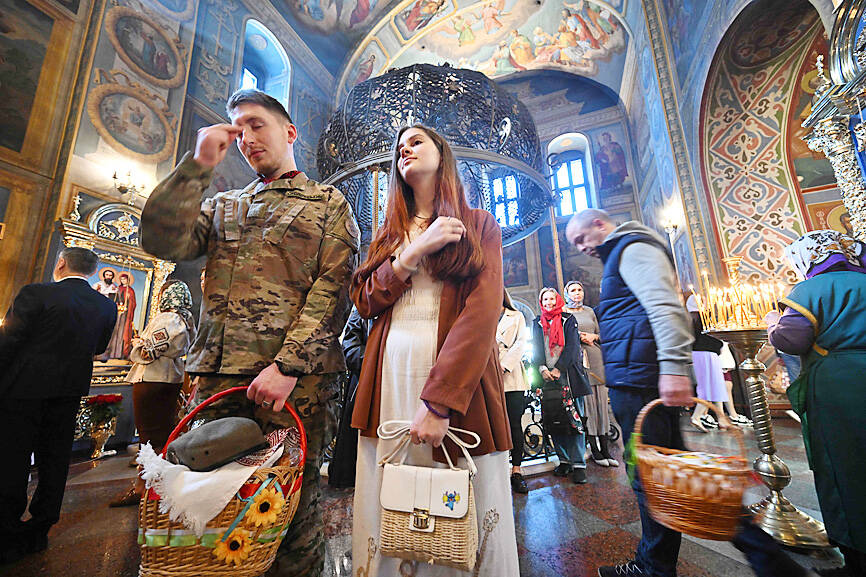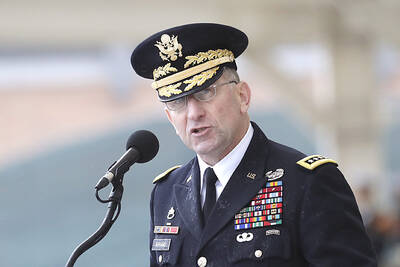Ukrainian President Volodymyr Zelenskiy yesterday said Russian forces were continuing their shelling and assaults along the front line despite Russian President Vladimir Putin announcing a surprise but brief Easter truce.
The 30-hour truce would be the most significant pause in the fighting throughout the three-year conflict.
However, just hours after the order was meant to have come into effect, air-raid sirens sounded in Kyiv and several other Ukrainian regions, with Zelenskiy accusing Russia of having maintained its attacks.

Photo: AFP
“Across various frontline directions, there have already been 59 cases of Russian shelling and five assaults by Russian units,” Zelenskiy said on social media, citing a report as of 6am from Ukrainian Armed Forces Commander-in-Chief Oleksandr Syrsky.
In the six hours up to midnight on Saturday, there were “387 instances of shelling and 19 assaults by Russian forces,” with drones “used by Russians 290 times,” Zelenskiy said.
“Overall, as of Easter morning, we can state that the Russian army is attempting to create the general impression of a ceasefire, while in some areas still continuing isolated attempts to advance and inflict losses on Ukraine,” Zelenskiy’s post said.
Putin’s order to halt all combat over the Easter weekend came after months of efforts by US President Donald Trump to get Moscow and Kyiv to agree a ceasefire.
On Friday, Washington even threatened to withdraw from talks if no progress was made.
“Today [Saturday] from 6pm to midnight Sunday, the Russian side announces an Easter truce,” Putin said in televised comments during a meeting with Russian Chief of the General Staff Valery Gerasimov.
Zelenskiy responded by saying Ukraine would follow suit, and proposed extending the truce beyond yesterday, despite accusing Russia of having already broken its promises.
“Russia must fully comply with the conditions of the ceasefire. Ukraine’s proposal to implement and extend the ceasefire for 30 days after midnight tonight remains on the table,” Zelenskiy’s post said.
Earlier he suggested that “30 days could give peace a chance” — while pointing out that Putin had already rejected a proposed 30-day full and unconditional ceasefire.
Putin had said the truce for the Easter holiday celebrated yesterday was motivated by “humanitarian reasons.”
While he expected Ukraine to comply, he said that Russian troops “must be ready to resist possible breaches of the truce and provocations by the enemy.”
Putin said the latest truce proposal would show “how sincere is the Kyiv’s regime’s readiness, its desire and ability to observe agreements and participate in a process of peace talks.”
Russia launched its full-scale invasion of neighboring Ukraine in February 2022.
Previous attempts at holding ceasefires for Easter in April 2022 and Orthodox Christmas in January 2023 were not implemented after both sides failed to agree on them.
On Saturday, Ukraine and Russia said they had each returned 246 soldiers being held as prisoners of war in a swap mediated by the United Arab Emirates.

‘FORM OF PROTEST’: The German Institute Taipei said it was ‘shocked’ to see Nazi symbolism used in connection with political aims as it condemned the incident Sung Chien-liang (宋建樑), who led efforts to recall Democratic Progressive Party (DPP) Legislator Lee Kun-cheng (李坤城), was released on bail of NT$80,000 yesterday amid an outcry over a Nazi armband he wore to questioning the night before. Sung arrived at the New Taipei City District Prosecutors’ Office for questioning in a recall petition forgery case on Tuesday night wearing a red armband bearing a swastika, carrying a copy of Adolf Hitler’s Mein Kampf and giving a Nazi salute. Sung left the building at 1:15am without the armband and apparently covering the book with a coat. This is a serious international scandal and Chinese

PERSONAL DATA: The implicated KMT members allegedly compiled their petitions by copying names from party lists without the consent of the people concerned Judicial authorities searched six locations yesterday and questioned six people, including one elderly Chinese Nationalist Party (KMT) member and five KMT Youth League associates, about alleged signature forgery and fraud relating to their recall efforts against two Democratic Progressive Party (DPP) legislators. After launching a probe into alleged signature forgery and related fraud in the KMT’s recall effort, prosecutors received a number of complaints, including about one petition that had 1,748 signatures of voters whose family members said they had already passed away, and also voters who said they did not approve the use of their name, Taipei Deputy Chief Prosecutor

UNDER ATTACK: Raymond Greene said there were 412 billion malicious threats in the Asia-Pacific region in the first half of 2023, with 55 percent targeting Taiwan Taiwan not only faces military intimidation from China, but is also on the front line of global cybersecurity threats, and it is taking action to counter those attacks, President William Lai (賴清德) said yesterday. Speaking at the opening of this year’s Cybersec Expo in Taipei, the president assured foreign diplomats and exhibitors that Taiwan remained committed to strengthening its defense against cyberattacks and enhancing the resilience of its digital infrastructure. Lai referenced a report from the National Security Bureau (NSB) indicating that the Government Service Network faced an average of 2.4 million intrusion attempts daily last year, more than double the figure

Retired US general Robert B. Abrams reportedly served as adviser to Chief of the General Staff Admiral Mei Chia-shu (梅家樹) during the Ministry of National Defense’s computer-simulated war games in the buildup to this year’s 41st annual Han Kuang military exercises, local media reported yesterday. For 14 days and 13 nights starting on April 5 and ending yesterday, the armed forces conducted the computer-simulated war games component of the Han Kuang exercises, utilizing the joint theater-level simulation system (JTLS). Using the JTLS, the exercise simulated a continuous 24-hour confrontation based on scenarios such as “gray zone” incursions and the Chinese People’s Liberation